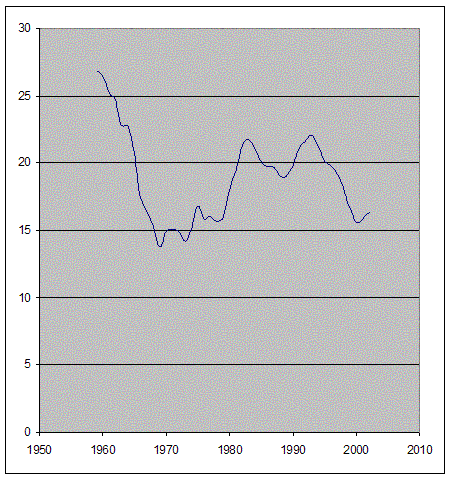-
Posts
7099 -
Joined
-
Last visited
Everything posted by Peter_Puget
-
Isn't that the latest Leavenworth thing?
-
"The regulators cited a long-standing rule in Canada, in which most copying for personal use was allowed. To repay artists and record labels for revenues lost by this activity, the government imposes a fee on blank tapes, CDs and even hard-disk-based MP3 players such as Apple's iPod, and distributes those revenues to copyright holders." Isn't that the same in the US at least as far as blank tape goes?
-
OW Wins! It is 3 O'Clock rock. I received more pm/emails about the pic than there are replies on this thread. It was taken from the ground. What's funny is three cc.com mods have separately done FA's that are visible in this face before cc.com ever existed. Can't wait to get out to D-Town with the new guide. PP
-
Isn't it route" i " with the "V4" finish?
-
Sorry Jim you're out to lunch. Murray -don't confuse the deficift with the O/S debt. PP
-
Come on Jim you are making a simple statement here regarding the size of the deficit. Certainly you must have made a calculation to know you are correct. Show us the math!
-
I suggest you look at the war years in the 40s.
-
Who is afraid of big bad MS?
-
Jim sorry but you are completely full of shit when you sday this "So the answer is yes, this administration is the largest budget deficit, even when compared to historical GDP. " Does honesty even matter to you? Of course I guess it does matter which historical gdp you are comparing to! PP
-
I think the tribe if anything does not deeply mourn the dead
-
Here's some cool data. Check out the attached graph! There were two distinct periods of poverty decline in the US, one ending about the point Johnson's "War on Poverty" began, the other starting just at the starting point of Clinton's welfare reform.
-
Check out tables 1.2,1.3,7.1 here What does tiny mean? I don't know but the deficit as a % of GDP is not out of control.
-
Where are they? PP
-
XXXXX DRUDGE REPORT XXXXX MON MARCH 22, 2004 12:04:25 ET XXXXX NEWS FOR SALE: CBS PUSHED BOOK IT OWNS; '60 MINUTES' DID NOT REVEAL PARENT COMPANY'S FINANCIAL STAKE IN CLARKE PROJECT CBSNEWS did not inform its viewers last night that its parent company owns and has a direct financial stake in the success of the book by former White House terror staffer turned Bush critic, Dick Clarke, the DRUDGE REPORT can reveal. 60 MINUTES aired a double-segment investigative report on the new book "Against All Enemies" -- but did not disclose how CBSNEWS parent VIACOM is publishing the book and will profit from any and all sales! ETHICAL BREACH CBS even used heavy promotion for the 60 MINUTES/book launch during its Sunday sports shows. It is not clear who made the final decision at CBSNEWS not to inform the viewer during 60 MINUTES how they were watching a news story about a VIACOM product. 60 MINUTES pro Lesley Stahl is said to have been aware of the conflict before the program aired. [CBSNEWS.COM did add a disclaimer to its Internet coverage of the book over the weekend: "Against All Enemies," which is being published Monday by FREE PRESS, a subsidiary of SIMON & SCHUSTER. Both CBSNews.com and SIMON & SCHUSTER are units of VIACOM." And CBS RADIO did carry a disclaimer in its news coverage of the book.] SIMON & SCHUSTER INFO-COMMERCIAL Earlier this year, it was Stahl who also profiled another author on 60 MINUTES -- for another book owned by VIACOMCBS -- without any disclaimer! "The Price of Loyalty" by former Treasury Secretary, turned Bush critic, Paul O'Neill was financed, produced and released [and rolled-out at CBSNEWS] by VIACOM's SIMON & SCHUSTER. Coming in future weeks, best-selling author Bob Woodward is set to release his PLAN OF ATTACK, a fresh look at the Bush White House. Will the Woodward VIACOMSIMON&SCHUSTER product debut on: VIACOMSIMON&SCHUSTERCBS's 60 MINUTES? [EDITOR'S NOTE: STAHL'S INTERVIEW WITH CLARKE WAS THE TOP-RATED SHOW OF SUNDAY NIGHT WITH 11.9 RATING/19 SHARE.]
-
Sorry J_B don’t have time lately to argue but a simple series of declarative statements does not an argument make. By the way I am currently reading an interesting series of essays on a new theory on dealing with terrorism it’s called “anticipatory retaliation” and is a breath of fresh air! I’m off climbing! PP
-
-
Hey your right. I am so use to the February closure date at other crags
-
Accessfund.org Midnight and Noontime Rocks and Vicinity: Okanogan-Wenatchee National Fores Closed to entry April 1 to July 31 to Protect Nesting Raptors. Raptors have been observed on and between Midnight and Noontime Rocks. During the nesting period, the site will be monitored and if conditions warrant, some restrictions may be lifted. Contact: Okanogan-Wenatchee National Forests, Lake Wenatchee and Leavenworth Ranger Districts 509/548-6977. Maybe the nests are empty this year.
-
Twin Cracks - Dirty, strenuous and a rest ledge halfway up. Bushes get in the way a bit. I was a bit scared because of lack of pro. Not really recommended. Way harder than Carnival Crack. Edited to add: If I remember correctly the crux is at the start of the first half of the route. Black Widow - Didn't lead but think it would be way easier than Twin Cracks. Short crux upper part turns into flaring chimney. Old bolts. Lower crack may be wet right now. Isn't Midnight closed right now?
-
Chuck – I think those arguing about the “rightness” or “wrongness” of Aznar’s policies or event the “rightness” or “wrongness” of the Bush administration miss the big issue with the Spanish election. The issue is did a terrorist act materially change or have the appearance of changing the outcome of an election. Whether the voters agreed with Aznar or not they were, in polls at least, supporting his party’s reelection. True, it is possible that the polls were in error and Aznar’s party would have not been winners absent the terrorist acts but that is where exit polls come in - something notably absent from your link. Why? Because they would not have supported the author’s viewpoint. I think it is clear that the acts of terror at least had the appearance of materially impacting the outcome of the election. The long-term effect of these events is yet to be seen. To the extent that the acts did impact the election results I imagine political discourse will be reduced and sovereignty relinquished. To the extent at which there is only the appearance of influence, we can at best expect an increase in terrorist acts. PP
-
Suppose that the US had bombed Madrid last week in order to compel the Spanish to vote in accordance with US wishes. Had the Spanish then voted in accordance to US wishes (a result contrary what polls indicated would be the result of the elections had the US intervention not occurred), wouldn’t we all consider Spanish sovereignty to be lost? How is this any different? In a real sense the Spanish have elected to abandon their sovereignty. This very act – an act by a free people – can only serve to encourage future acts of terrorism before elections in other countries. The only real solution at least in the short term would be for political parties to advocate policies that are not offensive to the terrorists. Is it inconceivable that politicians advocating offensive policies will come under attack for endangering innocent lives? I guess time will tell. How ironic it will be if the Europeans turned out to be freer living under literally under the shadow of Soviet tanks than they are as democracies not threatened other nation states. PP
-
J-B - I didn't properly identify the last quote. It was actually from the Guardian. Jayb - You forgot Germany, Chile, Slovenia just to name a few. Despite the best efforts of the Islamic terrorists, or window breaking teenagers at Starbucks the worldwide capitalist revolution will continue and leave considerably more free and democratic institutions in its wake. Those who behave like western Europe will be left treading water wondering how they fell out of the boat.



